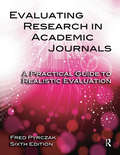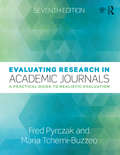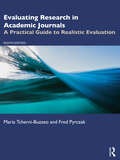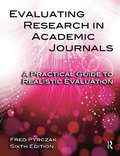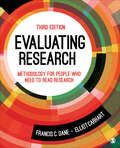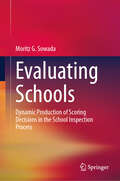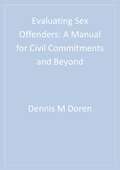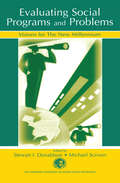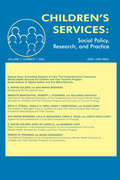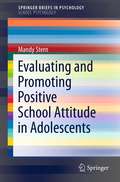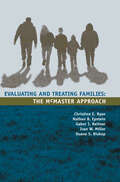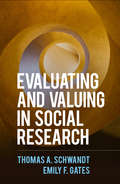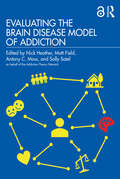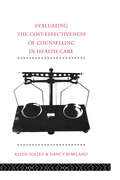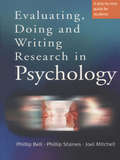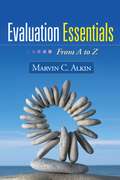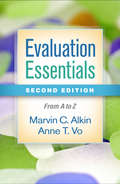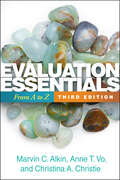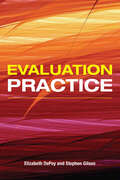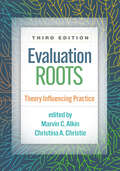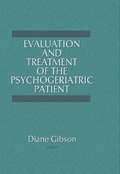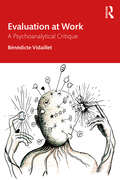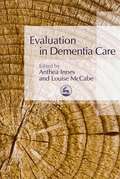- Table View
- List View
Evaluating Research in Academic Journals: A Practical Guide to Realistic Evaluation
by Fred Pyrczak• A supplementary guide for students who are learning how to evaluate reports of empirical research published in academic journals. • Your students will learn the practical aspects of evaluating research, not just how to apply a laundry list of technical terms from their textbooks. • Each chapter is organized around evaluation questions. For each question, there is a concise explanation of how to apply it in the evaluation of research reports. • Numerous examples from journals in the social and behavioral sciences illustrate the application of the evaluation questions. Students see actual examples of strong and weak features of published reports. • Commonsense models for evaluation combined with a lack of jargon make it possible for students to start evaluating research articles the first week of class. • The structure of this book enables students to work with confidence while evaluating articles for homework. • Avoids oversimplification in the evaluation process by describing the nuances that may make an article publishable even though it has serious methodological flaws. Students learn when and why certain types of flaws may be tolerated. They learn why evaluation should not be performed mechanically. • This book received very high student evaluations when field-tested with students just beginning their study of research methods. • Contains more than 60 new examples from recently published research. In addition, minor changes have been made throughout for consistency with the latest edition of the Publication Manual of the American Psychological Association.
Evaluating Research in Academic Journals: A Practical Guide to Realistic Evaluation
by Fred Pyrczak Maria Tcherni-BuzzeoEvaluating Research in Academic Journals is a guide for students who are learning how to evaluate reports of empirical research published in academic journals. It breaks down the process of evaluating a journal article into easy-to-understand steps, and emphasizes the practical aspects of evaluating research – not just how to apply a list of technical terms from textbooks. The book avoids oversimplification in the evaluation process by describing the nuances that may make an article publishable even when it has serious methodological flaws. Students learn when and why certain types of flaws may be tolerated, and why evaluation should not be performed mechanically. Each chapter is organized around evaluation questions. For each question, there is a concise explanation of how to apply it in the evaluation of research reports. Numerous examples from journals in the social and behavioral sciences illustrate the application of the evaluation questions, and demonstrate actual examples of strong and weak features of published reports. Common-sense models for evaluation combined with a lack of jargon make it possible for students to start evaluating research articles the first week of class. New to this edition New chapters on: evaluating mixed methods research evaluating systematic reviews and meta-analyses program evaluation research Updated chapters and appendices that provide more comprehensive information and recent examples Full new online resources: test bank questions and PowerPoint slides for instructors, and self-test chapter quizzes, further readings and additional journal examples for students.
Evaluating Research in Academic Journals: A Practical Guide to Realistic Evaluation
by Fred Pyrczak Maria Tcherni-BuzzeoEvaluating Research in Academic Journals is a guide for students learning how to evaluate reports of empirical research published in academic journals. It breaks down the process of evaluating a journal article into easy-to-understand steps and emphasizes the practical aspects of evaluating research. The book describes the nuances that may make an article publishable, even when it has serious methodological flaws. Students learn when and why certain types of flaws may be tolerated, and why evaluation should not be performed mechanically. Each chapter is organized around evaluation questions, and the book includes numerous examples from journals in the social and behavioral sciences to illustrate the application of evaluation questions and provide actual instances of strong and weak features of published reports. Common-sense models for evaluation, combined with a lack of jargon make it possible for students to start evaluating research articles in the first week of class, making this the ideal textbook for instructors and students across a range of disciplines. New to this edition: A new chapter on Types of Research Coverage of the new realities of online survey methods and research using big data A new appendix on Emerging Issues in Survey Research More emphasis and information on qualitative, case studies, and action research Expanded discussion of research ethics, including additional research-ethics-oriented guidelines, and new appendices devoted to noteworthy cases of research ethics breaches. The accompanying Instructor and Student Resources provide free digital materials designed to test student knowledge and save time when preparing lessons, including over 150 multiple-choice questions, articles, videos, and weblinks for students to test their knowledge of the material and further their understanding of concepts; and downloadable lecture slides and test banks for instructors.
Evaluating Research in Academic Journals: A Practical Guide to Realistic Evaluation (Sixth Edition)
by Fred PyrczakYour students will learn the practical aspects of evaluating research, not just how to apply a laundry list of technical terms from their textbooks. • Each chapter is organized around evaluation questions. For each question, there is a concise explanation of how to apply it in the evaluation of research reports. • Numerous examples from journals in the social and behavioral sciences illustrate the application of the evaluation questions. Students see actual examples of strong and weak features of published reports. • Commonsense models for evaluation combined with a lack of jargon make it possible for students to start evaluating research articles the first week of class. • The structure of this book enables students to work with confidence while evaluating articles for homework. • Avoids oversimplification in the evaluation process by describing the nuances that may make an article publishable even though it has serious methodological flaws. Students learn when and why certain types of flaws may be tolerated. They learn why evaluation should not be performed mechanically. • This book received very high student evaluations when field-tested with students just beginning their study of research methods. • Contains more than 60 new examples from recently published research. In addition, minor changes have been made throughout for consistency with the latest edition of the Publication Manual of the American Psychological Association.
Evaluating Research: Methodology for People Who Need to Read Research
by Francis C. Dane Elliot Donald CarhartThe third edition of Evaluating Research by Francis C. Dane and Elliot Carhart provides students with the skills to read and evaluate research studies. Aimed at courses where it is more important for students to develop an understanding of methods, rather than conduct their own research, this book covers all aspects of reading social, behavioral, and health science research from the basics, such as the structure of reports and accessing research, as well as overviews of the main types of research methods. The authors emphasize critical reading skills to enable students to become experts in evaluating research, so students can decide whether to incorporate that research into their future professional activities. Each chapter includes an overview at the beginning and exercises at the end to reinforce the content learned. Starting from the basic principles of why we do research, the book moves readers through the practicalities of finding studies to the principles of the scientific method and how to break down and analyze research reports. New to the third edition, Understanding Checks placed throughout each chapter help students cement their learning. The organization of the book is now more logical, with a new chapter on accessing research up front and ending with a chapter on statistical analyses. New research examples throughout, including such topical examples as mindfulness, college attendance, and bias in healthcare, help students see the relevance of research in their lives.
Evaluating Research: Methodology for People Who Need to Read Research
by Francis C. Dane Elliot Donald CarhartThe third edition of Evaluating Research by Francis C. Dane and Elliot Carhart provides students with the skills to read and evaluate research studies. Aimed at courses where it is more important for students to develop an understanding of methods, rather than conduct their own research, this book covers all aspects of reading social, behavioral, and health science research from the basics, such as the structure of reports and accessing research, as well as overviews of the main types of research methods. The authors emphasize critical reading skills to enable students to become experts in evaluating research, so students can decide whether to incorporate that research into their future professional activities. Each chapter includes an overview at the beginning and exercises at the end to reinforce the content learned. Starting from the basic principles of why we do research, the book moves readers through the practicalities of finding studies to the principles of the scientific method and how to break down and analyze research reports. New to the third edition, Understanding Checks placed throughout each chapter help students cement their learning. The organization of the book is now more logical, with a new chapter on accessing research up front and ending with a chapter on statistical analyses. New research examples throughout, including such topical examples as mindfulness, college attendance, and bias in healthcare, help students see the relevance of research in their lives.
Evaluating Schools: Dynamic Production of Scoring Decisions in the School Inspection Process
by Moritz G. SowadaThis book provides an analysis of how inspection teams evaluate schools – especially how they decide on assigning scores. It shows how the governance of schools through evaluation is enacted pragmatically. With its focus on the practice of evaluation by a group of external experts, it contributes to the expanding interdisciplinary field devoted to studying phenomena of the ‘evaluation society’ spanning from assessment research to programme evaluation, from the psychology of decision-making to the sociology of valuation and evaluation. Additionally, it argues that official inspection systems frame the inspection process, but cannot fully determine scoring practice. The implementation of official scoring guidelines is characterized by irreducible uncertainty requiring professional discretion for its resolution. Inspection teams thus must employ a flexible and pragmatic approach to finalize their scoring task. By drawing on empirical data from six observed inspection teams from two German states, it provides profound insights into how real evaluation decisions were made. This book is valuable to anyone seeking to understand evaluation in education – in particular scholars, policy-makers and educators in the field of school evaluation and accountability.
Evaluating Sex Offenders: A Manual for Civil Commitments and Beyond
by Dennis M. DorenEvaluating Sex Offenders is the first and only "how to" book describing the complete sex offender civil commitment evaluation. Aimed at helping practitioners, clinicians, counselors, and parole officers assess risk and evaluate offenders who have been convicted of a sex crime, the text offers readers a step-by-step description of what examiners need to know, including information gathering, interviewing offenders, and writing reports. Chapter topics include: defining risk; data gathering; diagnostic issues; recidivism base rates; risk factor lists; actuarial scales; instrumentation (violent and sexual); the evaluation report; presenting in court; ethical issues.
Evaluating Social Programs and Problems: Visions for the New Millennium (Claremont Symposium on Applied Social Psychology Series)
by Stewart I. Donaldson Michael ScrivenToday's evaluators are being challenged to help design and evaluate social programs intended to prevent and ameliorate complex social problems in a variety of settings, including schools, communities, and not-for-profit and for-profit organizations. Drawing upon the knowledge and experience of world-renowned evaluators, the goal of this new book is to provide the most up-to-date theorizing about how to practice evaluation in the new millennium. It features specific examples of evaluations of social programs and problems, including the strengths and weaknesses of the most popular and promising evaluation approaches, to help readers determine when particular methods are likely to be most effective. As such, it is the most comprehensive volume available on modern theories of evaluation practice. Evaluating Social Programs and Problems presents diverse, cutting-edge perspectives articulated by prominent evaluators and evaluation theorists on topics including, but not limited to: *Michael Scriven on evaluation as a trans-discipline; *Joseph S. Wholey on results-oriented management; *David Fetterman on empowerment evaluation; *Yvonna S. Lincoln on fourth-generation evaluation; *Donna M. Mertens on inclusive evaluation; *Stewart I. Donaldson on theory-driven evaluation; and *Melvin M. Mark on an integrated view of diverse visions for evaluation. Evaluating Social Programs and Problems is a valuable resource and should be considered required reading for practicing evaluators, evaluators-in-training, scholars and teachers of evaluation and research methods, and other professionals interested in improving social problem-solving efforts in the new millennium.
Evaluating Systems of Care: The Comprehensive Community Mental Health Services for Children and Their Families Program. A Special Issue of children's Services: Social Policy, Research, and Practice
by E. Wayne Holden Ana Maria BrannanThis issue consists of five articles profiling different aspects of the national evaluation of the Comprehensive Community Mental Health Services for Children and Their Families Program. Over the last eight years, this program provided grants to develop community-based systems of care for children with serious emotional disturbance and their families. A comprehensive, multilevel evaluation has been conducted that has provided information to local grantee communities and the federal government on the implementation and effectiveness of systems of care. Touching on a range of questions that the evaluation is designed to address, the articles in this special issue provide more general information on the system-of-care approach to addressing children's mental health problems.
Evaluating and Promoting Positive School Attitude in Adolescents
by Mandy SternAt a time when rates of depression and other mental health problems are increasing significantly among high school students, measures of school attitude and well-being are of central importance to school practitioners. Students with positive attitudes about school experience more beneficial outcomes and are also less likely to engage in maladaptive, risky behaviors. Therefore, monitoring how students feel about their experiences at school is important, and a novel, fresh approach to examining school attitude is sorely needed. Past studies of school attitude have generally focused on internal, psychological correlates of school attitude, such as individual and subjective reports of students' attitude toward school and their motivation levels. Evaluating and Promoting Positive School Attitude in Adolescents goes beyond these traditional measurements and explores less psychologically focused indicators, including ecological factors and observable behaviors. This study provides school psychologists with a new, comprehensive, and ecologically based approach with which to evaluate the school attitude of high school students.
Evaluating and Treating Families: The McMaster Approach
by Christine E. Ryan Nathan B. Epstein Gabor I. Keitner Ivan W. Miller Duane S. BishopThis comprehensive text is organized into two parts, the first of which presents an overview of the history, development, and theory of the model, and its specific applications to treatment, training, assessment, and research. Part II includes the instruments and assessment tools originally developed by the authors during their extensive clinical and research experience. Clinical case examples drawn from over four decades of family therapy work enrich the text, and an entire chapter is devoted to the authors' own research findings, current research plans, and new directions in their work.
Evaluating and Valuing in Social Research
by Thomas A. Schwandt Emily F. GatesMuch applied research takes place as if complex social problems--and evaluations of interventions to address them--can be dealt with in a purely technical way. In contrast, this groundbreaking book offers an alternative approach that incorporates sustained, systematic reflection about researchers' values, what values research promotes, how decisions about what to value are made and by whom, and how judging the value of social interventions takes place. The authors offer practical and conceptual guidance to help researchers engage meaningfully with value conflicts and refine their capacity to engage in deliberative argumentation. Pedagogical features include a detailed evaluation case, "Bridge to Practice" exercises and annotated resources in most chapters, and an end-of-book glossary.
Evaluating the Brain Disease Model of Addiction
by Sally Satel Antony C. Moss Nick Heather Matt FieldThis ground-breaking book advances the fundamental debate about the nature of addiction. As well as presenting the case for seeing addiction as a brain disease, it brings together all the most cogent and penetrating critiques of the brain disease model of addiction (BDMA) and the main grounds for being skeptical of BDMA claims. The idea that addiction is a brain disease dominates thinking and practice worldwide. However, the editors of this book argue that our understanding of addiction is undergoing a revolutionary change, from being considered a brain disease to a disorder of voluntary behavior. The resolution of this controversy will determine the future of scientific progress in understanding addiction, together with necessary advances in treatment, prevention, and societal responses to addictive disorders. This volume brings together the various strands of the contemporary debate about whether or not addiction is best regarded as a brain disease. Contributors offer arguments for and against, and reasons for uncertainty; they also propose novel alternatives to both brain disease and moral models of addiction. In addition to reprints of classic articles from the addiction research literature, each section contains original chapters written by authorities on their chosen topic. The editors have assembled a stellar cast of chapter authors from a wide range of disciplines – neuroscience, philosophy, psychiatry, psychology, cognitive science, sociology, and law – including some of the most brilliant and influential voices in the field of addiction studies today. The result is a landmark volume in the study of addiction which will be essential reading for advanced students and researchers in addiction as well as professionals such as medical practitioners, psychiatrists, psychologists of all varieties, and social workers.
Evaluating the Cost-Effectiveness of Counselling in Health Care
by Nancy Rowland Keith TolleyLimited resources in health care mean that the value of counselling is decided in a highly competitive economic arena. Keith Tolley and Nancy Rowland have written a practical guide to the basic principles of evaluating cost-effectiveness to enable counsellors and service providers to carry out analysis for themselves. They provide helpful definitions of technical terms and use case studies to demonstrate how to apply the theory in different contexts.
Evaluating the Impact of Prevention and Early Intervention Activities on the Mental Health of California's Population
by Claude Messan Setodji M. Audrey Burnam Katherine E. Watkins Edward N. OkekeThis report describes development of a statewide framework for evaluating and monitoring the short- and long-term impact of prevention and early intervention funding for mental health services on the California population. It details the approach, the data sources, and the frameworks developed: an overall approach framework and outcome-specific frameworks.
Evaluating, Doing and Writing Research in Psychology: A Step-by-Step Guide for Students
by Phillip Staines Joel Michell Dr Philip BellEvaluating, Doing and Writing Research in Psychology is a thoroughly revised and expanded co-edition of the highly regarded Reasoning and Argument in Psychology, originally published by UNSW Press, Australia. It represents a comprehensive textbook for all undergraduates in psychology who need to undertake empirical research, taking them step-by-step through the process. In particular, it offers the a range of study skills enabling the student to understand the complex processes involved with psychological research, not really covered in other texts. Coverage includes: · A guide to evaluating statements, arguments and a range of different psychological explanations · Chapters on the interpretation and evaluation of data and evidence, understanding weaknesses in psychological argument, and measurement and numerical reasoning · Chapters on doing a literature review, writing up essays and projects, and reporting observational studies. This is a practical textbook. Textboxes are included to help students comprehend jargon, key research terms and likely problem areas in psychological research.At the end of each chapter, summaries, questions and exercises are included - all designed to give students extra clarification of issues and to help with their overall understanding. Plenty of new examples have been added from the previous edition and exercises are more clearly focused.
Evaluation Essentials
by Marvin AlkinWritten in a refreshing conversational style, this text thoroughly prepares students, program administrators, and new evaluators to conduct evaluations or to use them in their work. The book's question-driven focus and clear discussions about the importance of fostering evaluation use by building collaborative relationships with stakeholders set it apart from other available texts. In 26 concise sections, Marvin C. Alkin explores how to articulate answerable evaluation questions, collect and analyze data using both quantitative and qualitative methods, and deal with contingencies that might alter the traditional sequence of an evaluation. Student-friendly features include handy bulleted recaps of each section, "Thinking Ahead" and "Next Steps" pointers, cautionary notes, annotated suggestions for further reading, and an in-depth case study that provides the basis for end-of-chapter exercises.
Evaluation Essentials, Second Edition: From A to Z
by Marvin C. Alkin Anne T. VoThoroughly revised and updated, this engaging text has given thousands of students and new evaluators the practical information and expert advice needed to conduct or use evaluations. In 26 concise sections, the book describes how to articulate answerable evaluation questions, collect and analyze data using both quantitative and qualitative methods, and deal with contingencies that might alter the traditional sequence of an evaluation. Special strengths of the text are its attention to individual, organizational, and community culture and emphasis on building collaborative relationships with stakeholders. An in-depth case study and related end-of-section exercises (including group activities) help students put themselves in the evaluator role. Other pedagogical features include section titles written as questions, bulleted recaps of each section, "Thinking Ahead" and "Next Steps" pointers, cautionary notes, and suggestions for further reading. New to This Edition *New and expanded topics: evaluation contracts, budgeting, surveys, data visualization, qualitative coding and memoing, factors affecting evaluation use, and context-sensitive evaluation. *Revised case study with extended exercises that guide the reader to complete a simulated evaluation. *End-of-section "Quick Read" links to recommended American Evaluation Association blog posts. *Four entirely new sections (such as "How Do You Strengthen Relationships with Stakeholders?" and "How Do We Plan a Process-Focused Evaluation Design?"), plus other changes and additions throughout.
Evaluation Essentials: From A to Z
by Christina A. Christie Marvin C. Alkin Anne T. VoBeloved for its conversational style and reliable advice, this text is now in a revised and updated third edition, reflecting key developments in evaluation. It includes expanded coverage of equity and social justice issues, values and cost analysis, visualizing qualitative data with software, and more. Twenty-six concise chapters, or "sessions," give students, applied researchers, and program administrators a solid foundation for conducting or using evaluations. Covering both quantitative and qualitative methods, the book emphasizes fostering evaluation use. It shows how to build collaborative relationships with users; formulate answerable evaluation questions; deal with contingencies that might alter the traditional sequence of an evaluation; and collect, analyze, and report data. Student-friendly features throughout the sessions include titles written as questions, bulleted recaps, "Thinking Ahead" and "Next Steps" pointers, cautionary notes, and annotated suggestions for further reading. An in-depth case study provides the basis for end-of-session practice exercises. New to This Edition *New sessions on context-sensitive evaluation, including the organizational, sociopolitical, and community contexts of a program. *New or expanded discussions of timely topics: identifying evaluation decision makers, analyzing program costs, coding and visualizing qualitative data with software, and more. *Updated suggestions for further reading and discussion in every chapter.
Evaluation Practice: How To Do Good Evaluation Research In Work Settings
by Elizabeth DePoy Stephen GilsonEvaluation Practice bridges the apparent gap between practice and research to present a logical, systematic model to guide all professional thinking and action within the context of everyday professional life. Their framework embraces diverse theories, action, and sets of evidence from a range of professional and disciplinary perspectives.
Evaluation Roots: Theory Influencing Practice
by Christina A. Christie Marvin C. AlkinShowing how evaluation practice looks when guided by theory, the third edition of the influential "theory tree" book is significantly revised with over 80% new material, including a greater focus on equity and theories over theorists. Chapters from leading authorities describe the goals of each theory; the type of evaluation for which it is appropriate (formative, summary formative, summative, adaptive); the size of the program for which it is most applicable; specific prescriptions; and observable actions that help to define the theory. Readers are given the tools to select suitable approaches for the size, contexts and stage of an evaluation and their own personal values. New to This Edition *Chapters on culturally responsive evaluation, Indigenous evaluation, and developmental evaluation. *Organized around theories rather than individual theorists. *Increased attention to practical applications, including a chapter distilling the goals, methods, and standards of evaluations based on each theory. *Case study chapter on the role of theory in evaluation policy.
Evaluation and Treatment of the Psychogeriatric Patient
by Diane GibsonThis pertinent book assists occupational therapists and other health care providers in developing up-to-date psychogeriatric programs and understanding details of treating the cognitively impaired elderly. There exists a significant demand for occupational therapy in psychogeriatrics now. As the elderly population increases, especially elderly requiring rehabilitative care, the need for occupational therapy in psychogeriatrics will increase markably. Evaluation and Treatment of the Psychogeriatric Patient emphasizes the expertise of leading psychogeriatric occupational therapists, focusing on transitional programming, treating cognitive deficits, and recognizing the malignant cultural myths which continue to disenfranchise and denigrate the elderly.Appropriate diagnosis and management of the elderly population is vital to their ability to function independently. Through detailed, operationally useful descriptions of current geriatric day care hospitals and psychogeriatric transitional programs, this book will be an invaluable aid for social workers, nurses, geriatric counselors, and physical therapists. These helping professionals will be better equipped to develop up-to-date psychogeriatric programs and will better understand the details involved in treating the mentally impaired elderly.
Evaluation at Work: A Psychoanalytical Critique
by Bénédicte VidailletEvaluation at work has attracted much criticism and its damaging effects are well known, so why does it continue to gain ground in every field? Evaluation at Work: A Psychoanalytical Critique offers an original answer to this question: evaluation spreads because we want to be evaluated. Developing a critical reflection from a psychoanalytic perspective, it argues that workers are not mere victims of evaluation systems but are complicit in them. In this fascinating volume, Bénédicte Vidaillet focuses on the aspects of our subjectivity that come into play in evaluation at work —our expectations, desires, need for recognition, our conceptions of ourselves at work, as well as our relationship with others such as colleagues, managers or clients — to explore how evaluation affects us, where it gets its evocative power, and what it stirs within us to make us want it, despite its detrimental effects in its currently practiced form. Chapters draw on real-life examples, case studies from a variety of organizations, and observations from clinical practice, to provide insight into the many mechanisms that have enabled evaluation to spread unimpeded through our subjective complicity in the process, revealing how they came to seem so innocuous. This book will be of interest to scholars studying the topic of evaluation at work from a critical perspective as well as professionals who use evaluation systems or are under the pressure of evaluation in all sectors and organizations. By exposing the psychological mechanisms that evaluation uses to appeal to us, it gives each of us the tools we need to break free of its grasp.
Evaluation in Dementia Care
by Louise Mccabe Anthea InnesThis authoritative collection sets out the critical role and application of evaluation in identifying and developing good practice in a range of dementia care settings. The contributors discuss the evaluation of care at different levels and in various settings, particularly long stay care, covering evaluation methods, ethics, use of technology and the user's role in the evaluation process itself. Their contributions on evaluating aspects of dementia care ranging from life story work and environmental considerations to medication and dementia care mapping is a useful basis for the discussion of future challenges in evaluation of dementia care. Practical and theoretical, this wide-ranging text is essential reading for dementia care practitioners at all levels, as well as students and researchers interested in dementia care practice.
